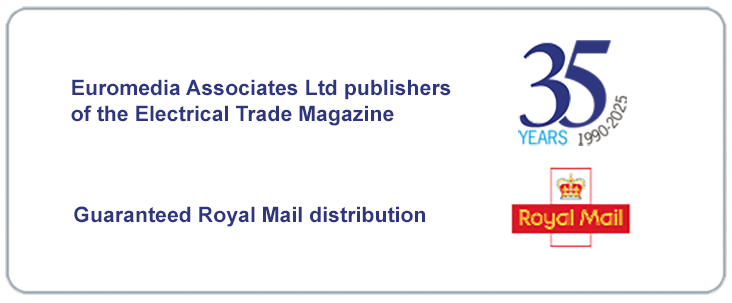Disturbing EU-wide scale of WEEE non-compliance
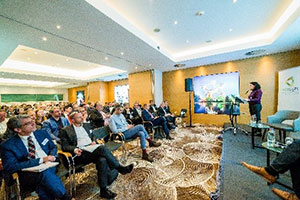
The results of a multi-national study into non-compliance of products sold through online marketplaces were revealed at a workshop hosted in Brussels on 6 November by EucoLight. EucoLight, the European Association for lighting WEEE compliance schemes, undertook a study of over 4200 products made available for sale through online marketplaces in 10 EU countries. The results showed an exceptionally high level of non-compliance with national WEEE requirements. The non-compliance was evident across a wide range of product groups. However, smaller products, such as LED lightbulbs, were particularly problematic, with non-compliance in the range of 78-100%. Recolight CEO and former EucoLight Vice President Nigel Harvey said “The high level of evasion of WEEE obligations this study has uncovered is truly shocking. This is non-compliance on an industrial scale.” He went on “It was therefore very pleasing to hear that a number of countries, including the UK, are considering a range of different solutions to address the issue. This patchwork approach could make compliance more awkward for the online marketplaces, but it is the only way to address the problem quickly.” Natalia Sierra Conde, Director of Institutional Relations of Ambilamp Spain, and Chair of the EucoLight Policy Working Group said “Making multi-seller online platforms responsible for compliance is the simple solution. There are far fewer organisations reporting data, which makes audit checks and monitoring easier. And the risk of avoidance of financial obligations is much reduced.” Commenting on the outcome of the discussions, EucoLight Secretary General Marc Guiraud said “When considering which approach to adopt, EucoLight actively encourages all Member States to require online marketplaces to fulfil the role of producer, in respect of all product brought into the national territory via their platform.”
EucoLight Conference adopts positions on eco-modulation
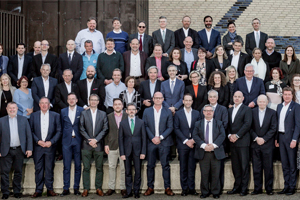
High on the agenda for the EucoLight annual conference this month were non-compliance of product sold through online marketplaces, impact of open scope and eco-modulation of WEEE fees. The 4th EucoLight annual conference held this year in Copenhagen was attended by 70 delegates from 19 lighting WEEE compliance schemes. External speakers providing additional insight and debate were; Joe Papineschi (Eunomia), Maximillian Kling (Ramboll), Christophe Roeland (European Commission DG GROW), Alexander Goldberg (EWRN), Malte Becker (AiDUP consultancy) and Emmanuel katrakis (EuRIC). Key outcomes from discussions Online non-compliance remains a major issue to be tackled – – A legislative solution must be put in place to avoid the sale of non-compliant products through online marketplaces, putting compliant operators at a competitive disadvantage. The EucoLight preferred solution is that online platforms are regarded as the ‘producer’ of all products for which they facilitate, by whatever means, the import or entry into the Member State territory. Strengthening compliance with EU product rules is essential – Christophe Roel and from the European Commission presented new legislation on market surveillance and compliance of products (the “Goods Package”). This defines useful tools that reinforce the ability of national enforcement authorities to take action. Relevance of eco-modulated fees for lamps questioned – the modulation of WEEE fees paid by producers are intended as an incentive for producers to design products that are better for the environment. EucoLight members concluded that the eco-modulation of fees will be ineffective in the lampsmarket. Existing Eco-design requirements, and powerful market forces are already having far more effect at driving producer and consumer behaviour, as they move from fluorescent to LED lamps. Better harmonisation of EEE scope in lighting– The conference agreed to adopt pan-European definitions of a lamp for WEEE purposes. These definitions had been developed by EucoLight and LightingEurope.\ For more information about WEEE compliance schemes please visit www.eucolight.org
Online marketplaces: a serious issue all over Europe
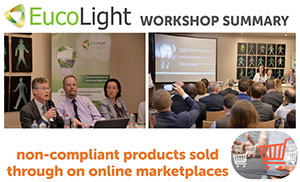
A workshop, hosted by Eucolight, the European association for lighting WEEE compliance schemes, gathered over 100 experts to discuss online sales of non-compliant products. The workshop concluded that solutions must be implemented to make online marketplaces responsible for products sold through their portals. The workshop, held in Brussels on 17 October, discussed the widespread availability of products through online marketplaces that do not comply with consumer safety standards, VAT requirements, and environmental obligations. High level speakers discussed who should be legally responsible for the non-conformity of products, and how this can be introduced into European and national legislation. The scale of the problem Leva Vardanyan, Market Compliance Manager of the Lighting Industry Association (LIA), reported on a retail mystery shopper testing study. The initial findings of the survey revealed that a high proportion of lighting products sold through online marketplaces have serious electrical safety risks. According to Ms Vardanyan, just removing the individual products detected from the market cannot be the solution, changes in the law and stronger tools for market surveillance are needed. Richard Allen, Lobbyist from Retailers Against VAT Abuse Schemes (RAVAS) described the large scale of VAT avoidance through online platforms. He argued that marketplaces have a great responsibility here. Through amendments to VAT legislation, the EU and and some Member States are supporting this approach and making marketplaces responsible. Germany, where there are new VAT obligations for online marketplaces if the seller is not compliant, is a good example. Nigel Harvey, Chief Executive of Recolight described a study undertaken by the WEEE Scheme Forum, to check the WEEE compliance of products sold through online marketplaces. This showed that 54% of power tools, 76% of LED lightbulbs, and 88% of fitness watches did not comply. Commenting on the study, Nigel Harvey said “Evidence shows there is large scale WEEE non-compliance sales through online marketplaces. High street retailers have, for many years, checked the compliance of equipment producers. Online marketplace operators could – and should – do the same. There can be no excuse for knowingly aiding the sale of products that break the law.” Monika Romenska, Regulatory & Public Affairs Manager,of EXPRA (Extended Producer Responsibility Alliance for Packaging and Packaging waste) added “Distance sales already represent up to 20 – 30 per cent of the market across various waste streams in certain Member States. By avoiding paying for their collection and reprocessing costs, these sales distort the market: they impose an unfair cost on compliant producers, thus rendering these – mostly local companies – less competitive.” The importance of greater consumer education was also mentioned. Triin Saag, of the European eCommerce & Omni-Channel Trade Association (EMOTA) argued, for example, that “product safety is a two way street where consumers should also be educated.” Views from the Commission Hans Ingels of DG Growth, speaking about the Goods Package, highlighted three principles for Member States to counteract an over-extended presence of non-compliant products on the market “1) working with businesses to prevent non-compliances instead of only policing the market; 2) fit-for purpose tools to check online sales of products and follow-up; and 3) improved cooperation between authorities across the EU.” Bettina Lorz, of DG Environment, supported coordinate enforcement actions at supra national/ national level. She argued that customs, tax and enforcement officials should work in a joined-up fashion with the environmental authorities on product regulation and enforcement: The Goods Package could be a good opportunity for implement this kind of synergy. Next steps – online marketplaces must take responsibility Summarizing the discussions, Marc Guiraud, Secretary General of EucoLight, stated ‘It is urgent for policy makers and online marketplaces to take action to address non-compliance of products sold online. Member States are already starting to implement this at a national level”.
OECD report confirms the large scale of WEEE non-compliance through online marketplaces
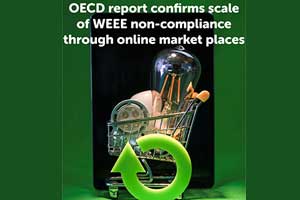
EucoLight has welcomed OECD report on ‘Extended Producer Responsibility (EPR) and the impact of online sales’, to which EucoLight members contributed. Recognition of the online WEEE non-compliance challenge, (free-riding), faced by Producer Compliance Schemes is a vital first step to addressing the problem. EucoLight endorses the recommendation to define multi seller online platforms as ‘producers’ of the products that they list from non-registered companies, and that transit through their fulfilment houses. The report indicates that online WEEE non-compliance is hindering the efficiency of WEEE systems, affecting around 5 to 10% of the total OECD Electric and Electronic Equipment (EEE) market. This issue affects especially small devices, such as LED lamps. EucoLight has been promoting policy responses to tackle WEEE non-compliance and is actively facilitating the debate among stakeholders and institutions, and to identify possible solutions. EucoLight Secretary General, Marc Guiraud explains: ‘WEEE schemes, which aim to make producers responsible for the environmental impact of the products they sell, have been key in increasing recycling and collection rates. When producers selling online avoid their obligations, they impose an unfair burden in the rest of the system and on compliant producers. Non -declared products prevent correct calculation of collection rates, and therefore achievement of the collection targets.” Nigel Harvey, EucoLight Vice President and Recolight CEO said: “The OECD report confirms the large scale of WEEE non-compliance through online marketplaces and fulfilment houses. There is an urgent need for regulatory change. The VAT system has been amended to make online fulfilment houses jointly liable for VAT payments for any product they hold in stock in the UK. A similar approach is now needed for WEEE.” About EucoLight EucoLight is the voice of European WEEE compliance schemes specialised in managing the collection and recycling of WEEE lighting; working to make the circular economy a reality for lighting products. On behalf of its 19 members, EucoLight engages with everything related to the WEEE Directive, legislations and standards affecting the collection and recycling of WEEE lighting. EucoLight members collect and recycle, in aggregate, 79 % of the lamps waste collected in the 18 countries in which they operate. Founded mid-2015, EucoLight has quickly embarked into constructive dialogue with relevant stakeholders to provide expertise in the field of management and treatment of WEEE lighting and to promote the positive role of Extended Producer Responsibility schemes on the environment and society. For more information, visit the EucoLight website, follow EucoLight on Twitter @EucoLight




